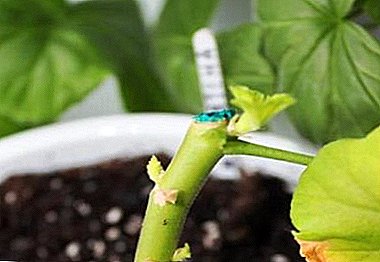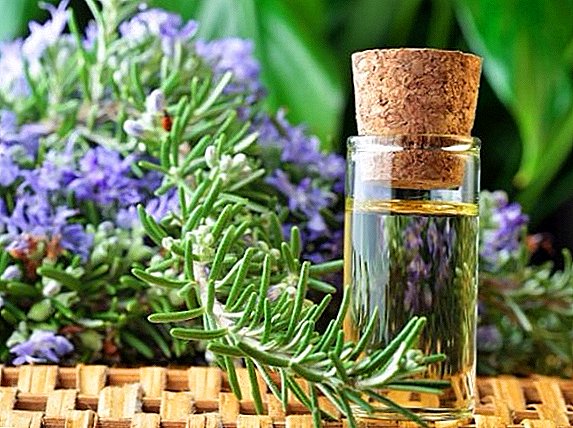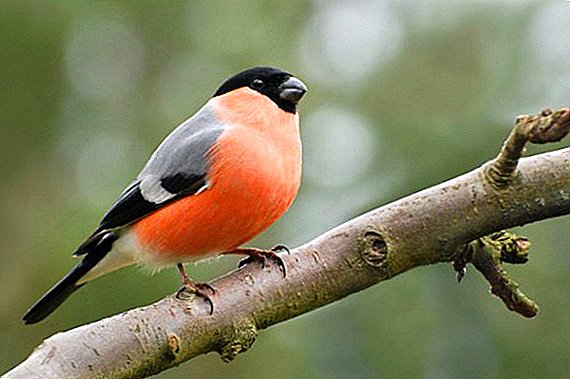 Fans of new drugs to combat pests and diseases of cultures consider iron sulfate as an obsolete tool. However, despite innovations in crop production, ferrous sulphate, thanks to a wide range of activity and safety, has not lost its popularity. Apply iron sulfate in the gardens to prevent and protect against the fungi of various types of cultivated trees and shrubs. This drug is used in the processing of storage from many parasites that can destroy the crop. Is it possible to use vitriol for caring for grapes, as well as the technique of application, we will tell in this article.
Fans of new drugs to combat pests and diseases of cultures consider iron sulfate as an obsolete tool. However, despite innovations in crop production, ferrous sulphate, thanks to a wide range of activity and safety, has not lost its popularity. Apply iron sulfate in the gardens to prevent and protect against the fungi of various types of cultivated trees and shrubs. This drug is used in the processing of storage from many parasites that can destroy the crop. Is it possible to use vitriol for caring for grapes, as well as the technique of application, we will tell in this article.
Why precisely iron sulphate
Experienced gardeners in the battle for plant health prefer to use time-tested preparations. And not in last place is ferrous sulfate (or ferrous sulphate (FeSO4), ferrous sulphate): it has no danger either to humans, or to animals, or to plants.
The substance is a bluish-green crystals. Under the influence of oxygen, its color changes to yellow. Iron sulfate dissolves well in water, which makes it easy to prepare a solution of the desired concentration.
Familiarize yourself with the use of ferrous sulfate in gardening.
One of the advantages of iron sulphate is its low (compared to finished products) cost. In addition, the substance can be used as a fertilizer, and as a disinfector, and as an insecticide or fungicide. 
Did you know? To grow healthy grapes and give a good harvest, parsley is sown under it. This spice discourages some pests.
Among the drawbacks of the drug is its inability to resist bacteria, the risk of burns of young leaves and weak shoots, the inability to penetrate deep into the plant tissue, a short-term effect (no more than 14 days).
Gardeners acquire blue vitriol for:
- processing plants in the off-season;
- fight against insects, their larvae;
- getting rid of fungal infections;
- healing damage to the shtamb;
- iron content in soil and plants;
- processing premises in which the crop is stored.
Learn more about how to prevent and fight diseases and pests of grapes.
Iron sulfate is used for such problems: 








Vineyard spraying
When growing grapes, it is recommended to process the iron sulfate twice: in spring and autumn. These procedures are somewhat different, so they should be considered separately.
In the spring
For the first time in a season, grapes are sprayed in the spring, when the frosts were already asleep, but the leaves did not have time to blossom (in the middle lane - this is March).
Read more about how to plant, water, feed and trim the grapes in spring.
To do this, use a solution of ferrous sulfate concentration of 0.5%.
- To obtain the necessary mixture, in a 10-liter bucket filled with cool water, dilute 50 g of crystals.
- The resulting composition is poured into a garden sprayer and they are treated with the surface of a bush (completely all parts that are above the ground) and the adjacent soil.
Important! This procedure is necessary to protect the bush and surrounding fruit crops from diseases and insects.

In the autumn
Before the onset of winter, vineyards are also treated with iron sulfate - this helps protect shrubs from the cold. Iron sulfate forms a kind of coating on wood that protects grapes from temperature fluctuations.
Such a procedure will not only allow the plant to better endure the winter, but will also ensure that fungi and pests do not settle in it.
- In autumn spraying (carried out at the end of the growing season, in late October or early November) 500 g of crystals are diluted with 10 liters of water (for adult bushes) or 300 g per 10 liters of water for young.
- It is also poured into the sprayer and the plant is treated completely and the surrounding soil.
- Before treatment, excess shoots and foliage are removed from the shrub.
We recommend reading about how to plant grapes in the fall with cuttings and seedlings, how to plant it, fertilize and trim it, and also how to properly prepare the plant for winter.
Video: processing of grapes in the autumn of vitriol The autumn procedure retards the development of buds for 2-3 weeks, which allows seedlings to develop more successfully. As we see, it is impossible to determine which treatment is better: autumn or spring. Each of them has its advantages.
Top dressing of a vineyard green vitriol
Insufficient amount of micronutrients in the soil adversely affects the amount of the crop. And the gland is assigned not the last role. The deficiency of this element is slowed down by vegetative processes, the leaves of the plant turn yellow, the number of young shoots decreases.
The normal iron content activates the production of chlorophyll, which contributes to the accumulation of nutrients. As a result - a healthy plant, large brushes, high yield.
Fertilizer iron sulphate soil can increase the iron content. Moreover, this element is in a dissolved state and is well absorbed by cultivated plants.  To eliminate the lack of iron, the soil under the grapes is fed with a 0.1-0.2% solution of vitriol (1-2 g of crystal per liter of water).
To eliminate the lack of iron, the soil under the grapes is fed with a 0.1-0.2% solution of vitriol (1-2 g of crystal per liter of water).
Important! If chlorosis occurs as a result of iron deficiency, the solution concentration is increased to 0.5%.
As a top dressing, it is possible to spray the grapes in early spring, immediately after the snow melts, and after the appearance of 4-5 leaves on the vine. The weather should be dry and windless. These periods are important for grapes, and it is then that they experience iron deficiency.
When digging up the soil in spring and autumn, you can add FeSO4 directly to the ground - 100 g of crystals per square meter. meter.
Use of ferrous sulfate to control pests and diseases
Treating the shrub with iron sulfate helps to effectively combat insect pests. Moreover, this substance not only protects against diseases, but also eliminates pests from larvae and eggs. 
- To obtain a solution, mix 150 g of crystals with 10 liters of water.
- Treatment mode - 1-2 times in the spring.
For the treatment of false or typical powdery mildew, as well as fungal diseases, a 3% mixture of ferrous sulfate is used. The composition is thoroughly mixed until the final dissolution of the substance. Apply the solution in spring and autumn, if there are signs of a disease, 2-3 times, with an interval of 7 days.
Important! Strong concentration is used only against diseases that already show their symptoms. If you apply such a solution in the form of prophylaxis, it can damage the shrub.
To prevent fungal trouble, grapes are treated with a weak composition (500 g per 10 liters of water). However, it should be borne in mind that iron sulfate can not be sprayed on the buds or green leaves. Shrubs are treated only in early spring or late autumn.  Work can be done in the summer, after the plant had had fungus diseases or powdery mildew. Then the iron sulfate will help save the grapes from the spores of mushrooms and the results of their activities.
Work can be done in the summer, after the plant had had fungus diseases or powdery mildew. Then the iron sulfate will help save the grapes from the spores of mushrooms and the results of their activities.
Iron vitriol against mosses and lichens
If lichens and mosses appeared on your site, in early spring you can spray the grapes with a 3% composition of ferrous sulfate. Activities are carried out several times in spring or autumn and spray only the bottom of the trunk. It is there that lichens and mosses concentrate.
It will be useful for you to read about whether to care for grapes during flowering, how to grow grapes from chubuk and bones, how to transplant and not damage grapes, when and how to pick grapes, how to graft and grape the grapes.
For manipulations use a sprayer with a thin socket, so that the mixture does not fall on the young shoots and foliage. 2-3 hours after applying the solution of parasites clean manually. After such a treatment, by the summer lichens and moss will weaken and no longer take root, and the bush will be healthier. 
Disinfection of the vineyard with iron sulfate
Iron sulfate is also useful in the summer, although the solution does not disinfect the grapes. If a compost heap, cesspit or other unfavorable place in which bacteria, viruses, and fungi develop easily, is near the shrub, then this becomes a cause for concern.
In this case, the "cereal" places are literally poured with a 5-7% solution of copper sulphate. It is unacceptable to spray plants with such a concentrated composition, but in the form of disinfection it fits perfectly - no bacteria and fungi will not tolerate such treatment.
We advise you to read about how to use copper sulfate in gardening, as well as the harm and consequences of poisoning the human body with copper sulfate.
Disinfection of wounds and cracks in the vine
For the treatment and disinfection of wounds resort to a concentrated composition (10 g per liter of water).  They are treated with damaged areas. Vine is treated with a soft brush every 5-6 days until the plant returns a healthy appearance. After drying at the place of lubrication, a thin film is formed, which protects the vine from bacteria.
They are treated with damaged areas. Vine is treated with a soft brush every 5-6 days until the plant returns a healthy appearance. After drying at the place of lubrication, a thin film is formed, which protects the vine from bacteria.
Did you know? The largest bunch of grapes was grown in 1984 in Chile. The weight of the record holder was 9.4 kg.Experienced winegrowers have long used iron sulfate and are satisfied with its action. However, if you do not belong to the category of sophisticated gardeners, carefully read our recommendations and take this tool into service.
Reviews from the network













